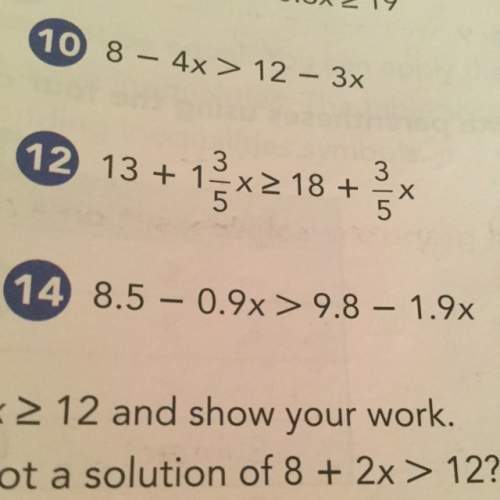
Mathematics, 17.11.2020 18:30 ScuddyG7164
The probability that a male develops some form of cancer in his lifetime is 0.4567. The probability that a male has at least one false positive test result (meaning the test comes back for cancer when the man does not have it) is 0.51. Some of the following questions do not have enough information for you to answer them. Write “not enough information” for those answers. Let C = a man develops cancer in his lifetime and P = man has at least one false positive. a. P(C) = b. P(P|C) = c. P(P|C') = d. If a test comes up positive, based upon numerical values, can you assume that man has cancer? Justify numerically and explain why or why not.

Answers: 2


Another question on Mathematics

Mathematics, 21.06.2019 14:30
Find a number such that if you add 8 and divide the result by 4 you will get the same answer as if you subtracted 3 from the original number and divided by 2
Answers: 3

Mathematics, 21.06.2019 22:30
For the chance to be team captain, the numbers 1-30 are put in a hat and you get two chances to pick a number, without replacement. which formula correctly shows how to find the probability that you choose the number 1 and then 2?
Answers: 1

Mathematics, 21.06.2019 23:00
Which radical expression is a rational number? a. √ 360 b. √ 644 c. √ 225 d. √ 122
Answers: 1

Mathematics, 22.06.2019 02:00
The product of 3 and a number increased by 8 is 31 written as an equation
Answers: 2
You know the right answer?
The probability that a male develops some form of cancer in his lifetime is 0.4567. The probability...
Questions


Mathematics, 30.11.2019 03:31


History, 30.11.2019 03:31

Mathematics, 30.11.2019 03:31

Mathematics, 30.11.2019 03:31




Biology, 30.11.2019 03:31


Mathematics, 30.11.2019 03:31

Physics, 30.11.2019 04:31

Spanish, 30.11.2019 04:31


Chemistry, 30.11.2019 04:31


Social Studies, 30.11.2019 04:31

Physics, 30.11.2019 04:31

Business, 30.11.2019 04:31




